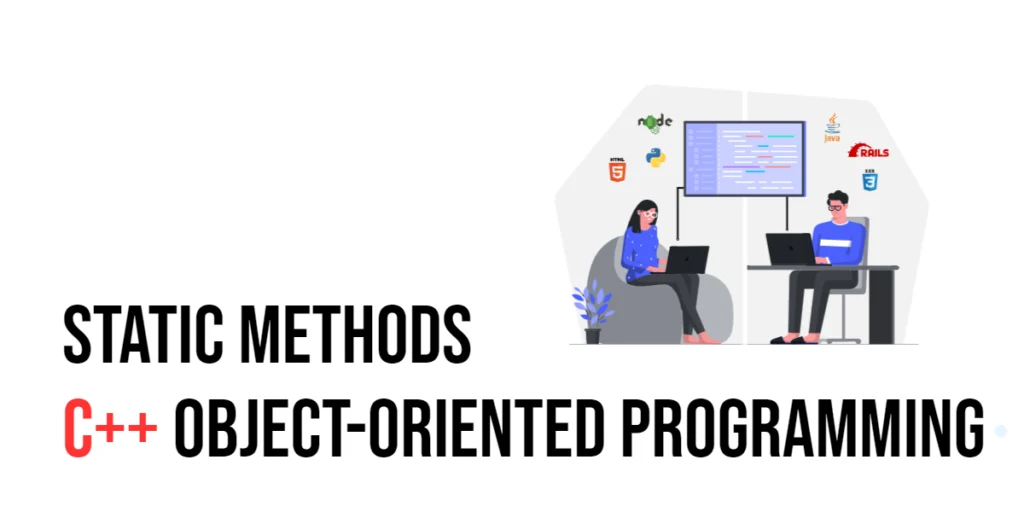In the world of C++ programming, understanding object-oriented concepts is essential for building strong and easy-to-maintain software. Static methods are one of these key concepts, known for their distinctive features and uses. This article serves as a thorough introduction to static methods in C++, tailored especially for beginners. We will cover what static methods are, how to write them, why they are useful, and provide detailed examples to help you learn how to implement them effectively in your programming projects. By the end of this article, you’ll have a solid grasp of static methods and how to leverage them to enhance your C++ coding skills.
What Are Static Methods?
Imagine a tool that’s shared in a workshop—usable by anyone without needing to own it personally. In C++, static methods are somewhat similar. They are special functions within a class that do not operate on specific instances of that class. Unlike the usual methods that work on objects created from a class (like personal tools in our workshop analogy), static methods do not require an object to be called. They work at the class level, meaning they can’t directly access the individual non-static attributes (like variables or methods) that belong to class instances.
How to Define and Use Static Methods
Static methods are marked with the keyword static within their class definition. Here’s a simple way to define and use such a method:
#include <iostream>
using namespace std;
class MyClass {
public:
static void myStaticMethod() {
std::cout << "This is a static method." << std::endl;
}
};
int main() {
// You can call the static method using the class name, without creating a class instance
MyClass::myStaticMethod();
}In this example, myStaticMethod can be invoked using the class name (MyClass::myStaticMethod()), bypassing the need for creating an instance of MyClass. This ability makes static methods accessible even when no class objects exist.
Benefits of Using Static Methods
Static methods are particularly advantageous in certain situations:
- Memory Efficiency: Static methods are memory savers. They do not require the instantiation of an object to be called, which means they do not consume the memory normally required for object data. This makes them ideal when you need a function that is independent of object state.
- Utility Functions: If you need a function that provides a utility or service without needing to interact with the instance-specific data of a class, static methods are the way to go. They are perfect for actions that are generic rather than object-specific.
- Global Access: Static methods can be accessed globally through the class name. This makes them incredibly accessible from any part of your code, providing a level of convenience, especially for widely used functionalities.
Static methods enhance the functionality of your C++ programs by providing a way to implement functions that are efficient, globally accessible, and independent of object instances. They simplify your coding tasks where instance-specific data is unnecessary, offering a neat, memory-efficient solution to many common programming problems.
Example: Using Static Methods in C++
Let’s dive into an illustrative example to see static methods in action. Imagine we’re building a simple banking application, and we need to track how many accounts have been created. This is a perfect scenario for using a static method. We’ll design a class called Account that uses a static method to monitor the number of accounts.
Here’s how you can structure this in C++:
#include <iostream>
class Account {
private:
static int count; // Static member to keep track of the number of accounts
public:
// Constructor to increment the count each time a new account is created
Account() {
count++;
}
// Destructor to decrement the count when an account is closed
~Account() {
count--;
}
// Static method to get the current number of accounts
static int getCount() {
return count; // Return the static member
}
};
// Initialize the static member outside the class
int Account::count = 0;
int main() {
// Creating multiple accounts
Account a1, a2, a3;
std::cout << "Total accounts: " << Account::getCount() << std::endl; // Output should be 3
// Adding another account to see the count change
{
Account a4;
std::cout << "Total accounts: " << Account::getCount() << std::endl; // Output should be 4
} // a4 goes out of scope here, so the count decreases
// Checking the count after the scope of a4 ends
std::cout << "Total accounts: " << Account::getCount() << std::endl; // Output should return to 3
return 0;
}In this code, Account::getCount() is a static method that provides the total number of account objects at any given moment. What’s special about this method is that you can call it without needing to create an instance of the Account class. This functionality is especially useful in scenarios where you need to get global information that pertains to the class as a whole, not just an individual instance.
This example illustrates how static methods can serve as utility functions within a class, providing valuable information while maintaining encapsulation and adhering to object-oriented principles. Using static methods wisely can lead to cleaner, more efficient, and manageable code in larger applications.
When to Use Static Methods
Static methods are particularly useful in several scenarios that emphasize efficiency and simplicity. Here are a few situations where you might consider using static methods in your C++ programming:
- Accessing Class-wide Information: If a method needs to access data that is shared across all instances of a class, rather than individual object-specific data, a static method is appropriate. Since static methods don’t rely on any particular object, they are perfect for interacting with class-wide data.
- Creating Utility Functions: Sometimes, you might need a function that performs a specific task, like calculating the square root of a number or formatting a date, which doesn’t manipulate or require data from an instance of a class. Static methods are ideal for these utility functions because they can be called without creating a class instance.
- Simplifying Code for Global Access: If you need a function that should be accessible from various parts of your program without the need to instantiate the class it belongs to, static methods make this possible. This global access can simplify your code and reduce the need for passing objects around unnecessarily.
Conclusion
Static methods in C++ are a robust tool for handling tasks that are independent of the instances of a class. They help in writing cleaner and more efficient code by avoiding unnecessary object creation and providing simpler, direct access to functions. As you gain more experience in C++ programming, effectively integrating static methods into your projects will enhance your coding toolkit, making your programs more modular and easier to maintain. This skill will not only improve your code but also deepen your understanding of object-oriented programming in C++.




